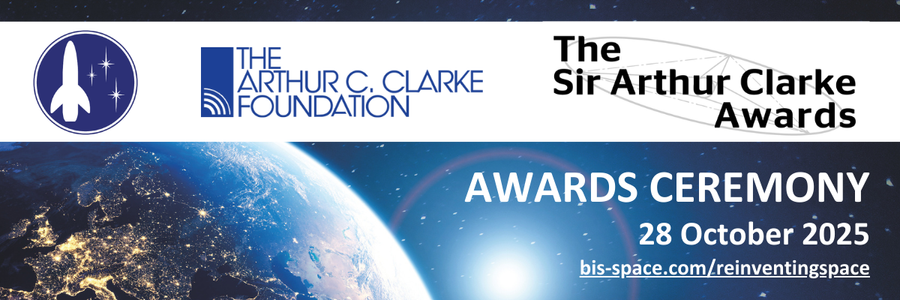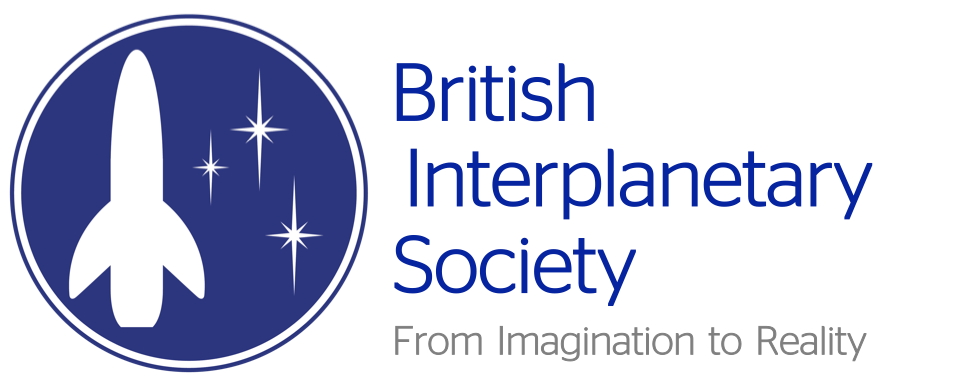The Arthur C. Clarke Foundation and the British Interplanetary Society (BIS) are pleased to announce the Finalists for the 2025 Sir Arthur Clarke Awards which will be presented at the BIS’s 22nd Reinventing Space Conference Gala Dinner and Awards at The Royal Aeronautical Society, 4 Hamilton Place, London, W1J 7BQ on Tuesday 28 October 2025.
Presented annually since 2005, ‘The Arthurs’ recognise and reward those individuals and teams that have made notable or outstanding achievements in, or contributions to, all space activities here in the UK. However, the Lifetime and International Awards are open to all.
This year all the Individual Finalists listed below have been invited to attend the Dinner and Awards on 28 October with a partner or guest and the Team Finalists are each asked to name three representatives.

The Finalists for the 2025 Sir Arthur Clarke Awards are:-
1. Space Achievement – Industry/Project Team
- The Race2Space Team
For providing the UK Space sector with better-prepared employees through improved industry/academia knowledge transfer and practical hands-on design, manufacture and testing of rocket engines - The Joint Commercial Operation (JCO) Team
For redefining what partnership in the space domain means, by uniting defence, industry, and academia to collaborate to face today’s escalating orbital threats. - Andrew Cawthorne and the SSTL Tyche Team
For the successful design, build, test and launch of the TYCHE satellite, the UK MOD’s first Intelligence Surveillance and Reconnaissance (ISR) satellite. - The UK/US Space Command Team
For unprecedented UK/US collaboration to make Space safer with combined in-orbit Rendezvous and Proximity Operations, as recently demonstrated by a US satellite being moved to check-out a UK military communications satellite on geostationary orbit.
2. Space Achievement – Industry/Project Individual
- Jay Tate
For establishing Spaceguard UK in 1997 to determine the threat of Near-Earth Objects and for remaining its Director till June 2025. Spaceguard was named after Arthur C. Clarke’s Project Spaceguard in his novel ‘Rendezvous with Rama’. - Carl Warren
For, as Chief Engineer on the Biomass mission at Airbus Defence & Space UK in Stevenage since 2009, he covered the satellite development from Phase A to its successful launch in April 2025. - Patrick Wood
For a highly successful 30+ year career in the aerospace industry, highlighted by his term as Programme Director for the SKYNET 5 programme and significant contributions to many other programmes whilst Senior Vice President of Integration at Airbus Space Systems.
3. Space Achievement – Academic Study/Research Team
- The Donald Rapp/Vasileios Inglezakis ISRU Team
For their research in expanding the scientific and engineering foundations of Martian ISRU (In-Situ Resource Utilization) and the emerging field of astrochemical engineering. - The Space AM LEVL Team
For the design of the auto-rotating Leading Edge Vortex Lift (LEVL) probes for the Venus Morning Star Mission in 2031. Due to their slow descent, the 30 probes will allow prolonged sampling of the atmosphere. - The Surrey Space Centre Space Environment and Protection Group’s MAIRE+ Team
For helping the Met Office Space Weather Centre to monitor and model space radiation at altitude to protect aeroplane avionics, deepen scientific understanding of the impacts of space weather and mitigate risks.
4. Space Achievement – Education and Outreach Team
- The Mars–Moon Astronautics Academy & Research Science (MMAARS) Team
For Expanding Diversity, Equity, Inclusion, and Accessibility (DEIA), Global Outreach and Education in STEAM-Space via MMAARS Virtual Astronautics and In-Person Training Programs. - The Race2Space Team
For establishing an annual propulsion competition to help to create the next generation of rocket engineers. - The Radio Society of Great Britain Team at Bletchley Park
For inspiring all generations about Amateur Satellites by providing a unique insight into the world of radio communications including displays of the work of Radio Amateurs in WW2.
5. Space Achievement – Education and Outreach Individual
- Dr Robert Watson
For his outstanding contribution to space education through the ‘Astrogazers Mission’, empowering Croydon High School to become the first all-girls school in the world to design, test, and prepare a CubeSat for launch. - Balazs Slezak
For his mentorship and education of space entrepreneurs in the UK and internationally and his work with the UKSA Accelerator and the ESA Academy. - James Clark
For, as the Apprenticeship Programme Manager, his launch of the Early Careers Centre at Airbus Portsmouth, which will nurture the next generation of space professionals in a ‘real’ space-production environment.
6. Space Achievement – Student
- Ethan Waisberg
For successfully leading the development of his team’s head-mounted visual assessment system, scheduled for deployment on the International Space Station in 2026, to evaluate NASA astronauts’ vision and enhance understanding of Spaceflight Associated Neuro-Ocular Syndrome (SANS) - The Jovian-O Team
For, as a joint Universities of Surrey, Southampton and Portsmouth Team, designing, building and testing the Jovian-O sub-orbital Earth-observation payload and integrating it onto a Stellar Kinetics rocket for launch from the Etlaq Spaceport, Oman. - Jordan Stone
For leading the international student team that won the 2025 Schweickart Prize, which aims to generate new ideas for Planetary Defence, by suggesting a panel on Asteroid Orbit Alteration to address the emerging risks.
7. Space Achievement – Media, broadcast and written Team
- The ‘Mission Bake’ Team
For the ‘Mission Bake’ social media series created by Lucy Hallam and the National Space Centre team along with Dr Josh Smalley at the University of Leicester to teach space science stories to families and youth groups through space-themed baking challenges. - The Cosm Studios/Planetary Collective/KUVA ‘Orbital’ Team
For Cosm Studios, Planetary Collective, and KUVA’s ‘Orbital’ immersive experience, connecting humanity through the immersive perspective of Space - Samantha Tauber (VNCCII)
For ‘’Galacta.i.ssance and the VNCCII Awakening, her company VNCCII’s Visionary Transmedia Sci-Fi Universe, part of which will be launched to the Moon in December 2025 on board NASA’s Griffin Astrobotics Lander.“
8. Lifetime Achievement
- Lord Martin Rees
For, as one of the world’s leading cosmologists, his contribution to the study of space and the universe, his 30 years as Astronomer Royal and his continued public engagement. - Dr Tao Huang
For a lifetime of achievements in engineering innovation, from phased-array antennas and die-cast components to deployable antennas and compact user terminals, that directly benefit the UK Space Sector.
9. International Achievement [Finalists and Awardees are selected by the Arthur C. Clarke Foundation Board]
- Dr Austin Mardon
For his contribution to science literacy among the public, for promoting disability inclusion in space exploration through pioneering research, advocacy, and global outreach initiatives and for finding 700 meteorites beyond the South Pole in Antarctica. - Cosm Studios/PlanetaryCollective/KUVA ‘Orbital’ Team
For Cosm Studios, Planetary Collective, and KUVA’s ‘Orbital’ immersive experience, connecting humanity through the immersive perspective of Space.

For further information please contact:
Alistair Scott
Past President, The British Interplanetary Society
UK Board Member, The Arthur C. Clarke Foundation
Arthur C. Clarke House,
27/29 South Lambeth Road
Vauxhall, London, SW8 1SZ
www.bis-space.com/contact/
